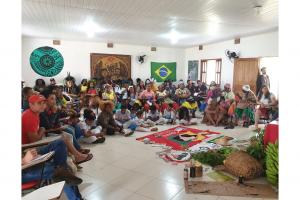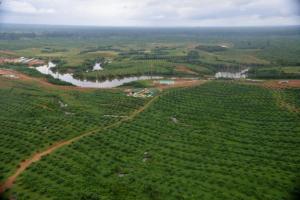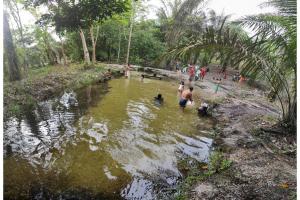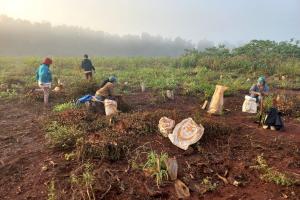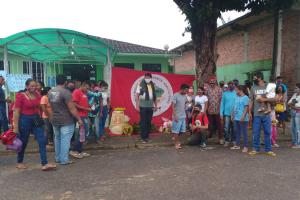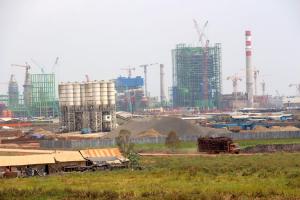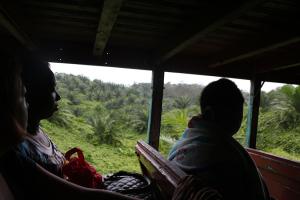Struggles Against Tree Monocultures
Corporate profit drives land grabs to install industrial tree monocultures. Where industrial plantations take root, communities' territories and lives are violently invaded, their forests destroyed and their water polluted. When communities resist, companies tend to respond with aggression. Despite this extreme violence, communities around the world are resisting, organizing and joining forces to defend their territories. Every September 21 the International Day of Struggle against Monoculture Tree Plantations is celebrated.
Bulletin articles
11 October 2022
The network that brings together movements, organizations and communities in the fight against tree plantations met in the Far South of the State of Bahia. This September 21st, it once again denounced the impacts of this violent and unjust model, which is based on large-scale plantations mostly for pulp export.
Bulletin articles
11 October 2022
The oil palm plantations of BIDCO, a company partially owned by Wilmar, in Kalangala Island, Uganda, generated devastating impacts. The company plans to expand to Buvuma Island, however, they keep confronting strong organized opposition! Watch a short video with testimonies of resistance from Buvuma Island.
Bulletin articles
11 October 2022
On the occasion of September 21st, 2022, the International Day of Struggle Against Monoculture Tree Plantations, WRM launched the briefing “12 Replies to 12 Lies about Industrial Tree Plantations”.
Bulletin articles
11 October 2022
The Informal Alliance Against the Expansion of Industrial Oil Palm Plantations in West and Central Africa released a declaration to keep breaking the silence of the many abuses around industrial plantations and to reaffirm their strong commitment to resist their expansion in the defence of their territories and lives.
Bulletin articles
12 September 2022
The quilombola communities of Sapê do Norte, Brazil, are living a violent process with the expansion of large-scale eucalyptus monoculture. After many hardships, they started a process to take back their water and land. And the struggle to take back what is theirs continues. WRM talked to two quilombola activists to reflect on this difficult but fertile process of resistance.
Bulletin articles
12 September 2022
Industrial palm oil production in West and Central Africa is mainly controlled by five multinational corporations, and could continue expansion. Plantations take up large tracts of land. Land and water are interdependent. Yet, the current water crisis in these territories would not exist if corporations had not grabbed the land from communities.
Bulletin articles
12 September 2022
There is no other crop that has grown faster globally in the last decade than palm oil. This almost uncontrollable expansion leaves a deep trail of destruction and conflicts around its giant areas of plantations from Southeast Asia to West and Central Africa. As companies take over more community land, they also grab the water sources from them.
Bulletin articles
16 June 2022
The Independent Producers of Piray (PIP) in Misiones, Argentina was formed in 2005 to stop the advance of multinational Arauco’s pine tree monocultures and reclaim the land. WRM spoke with Miriam Samudio, a key member of the PIP family, to reflect on the process of the struggle and the lessons learned.
Bulletin articles
16 June 2022
In Brazil, oil palm plantations are expanding rapidly, mainly in the Amazonian state of Pará. BBF (Brasil BioFuels), the largest oil palm company in Brazil, stands accused of environmental crimes and violence against indigenous, quilombola and peasant communities such as Virgílio Serrão Sacramento, a community linked to the Small Farmers’ Movement (MPA).
Bulletin articles
16 June 2022
More than 10 million hectares in Indonesia are controlled by the pulp and paper industry, mainly by two giant corporations: APP and APRIL. Despite the companies’ commitments to protect forests and peatland, both keep being associated with deforestation, forest fires and to a business model of violence, criminalization and dispossession of forest communities. (Available in Bahasa Indonesia)
Bulletin articles
16 June 2022
Communities resisting the impunity and impacts of oil palm growers in Ecuador: Cases from Esmeraldas
There are currently 270,000 hectares of oil palm plantations in Ecuador. The resistance processes of the communities of La Chiquita, Guadualito and Barranquilla de San Javier in the region of Esmeraldas continue to generate outrage and solidarity among other communities, and internationally.
Bulletin articles
16 June 2022
Quilombola Communities’ Resistance Against Suzano Company in the Southernmost part of Bahia, Brazil
A conversation with the president of the Volta Miúda Quilombola Association and of the Southernmost part of Bahia Quilombola Cooperative revealed how Suzano, the world’s largest paper and cellulose corporation, continues to operate with serious violations and illegalities. Communities keep fighting to reclaim their lands back.
